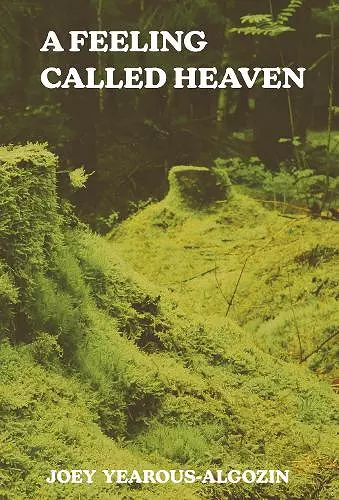A Feeling Called Heaven
Meditations on existence and the future of our planet
Format:Paperback
Publisher:Nightboat Books
Published:14th Oct '21
Currently unavailable, and unfortunately no date known when it will be back

This book explores human extinction and the flourishing of a post-apocalyptic Earth, blending humor and grief in a unique meditation.
In A Feeling Called Heaven, the author invites readers on a contemplative journey through the concept of human extinction. Adopting the persona of a death doula or a New Age spiritual guide, Yearous-Algozin encourages us to confront the reality of our planet's end times. This guided meditation explores the potential for a post-apocalyptic Earth, one that flourishes in the absence of humanity. Through this lens, the narrative draws from the Theater of the Absurd, blending elements of humor and sorrow in a unique manner.
The book oscillates between feelings of grief for what is lost and a lighthearted acknowledgment of the resilience of the nonhuman world. As the author paints vivid imagery of a thriving ecosystem rising from the remnants of our civilization, readers are prompted to cultivate a deeper sense of presence and intimacy with the inevitable changes to our environment. This exploration is not merely a lamentation of loss but an invitation to envision what life might look like after humanity.
Ultimately, A Feeling Called Heaven serves as a thought-provoking meditation on existence and extinction. It challenges us to reflect on our impact on the Earth while simultaneously embracing the idea of rebirth and renewal in a world that continues to evolve, regardless of our presence. The blend of humor and reflection makes this work both poignant and accessible, inviting readers to engage with difficult themes in a meaningful way.
“I read A Feeling Called Heaven as an exercise in relational aesthetics, similar to a guided meditation or a Pauline Oliveros Deep Listening exercise. While in the text’s suggestive state, the drone of annihilation is more or less audible depending on what else punctuates the soundscape. While I am wary of framing extinction as the immanent affect (rather than concentrating on destroying the mechanisms that cause it), the irony of this defeatism that A Feeling Called Heaven represents is familiar and felt by many, including myself…”—The Believer
"Through its radical acceptance, A Feeling Called Heaven teaches an important lesson about pausing, being present, and deeply listening, both inside and outside ourselves. Perhaps, by engaging in this practice, we can commune with the resonant angels, or 'a pod of dolphins…framed by purple flames.'"—Social Text Journal
"While the apocalypse itself feels foreboding, this long poem underscores the joy of the world’s persistence… A Feeling Called Heaven offers a hopeful refusal of the apocalyptic depression that accompanies many poems on the environment."—Jacket2
A Feeling Called Heaven exists somewhere between dream, irony and ecopoetic anti-capitalist treatise (not unlike Ryan Fitzpatrick’s 2023 collection Sunny Ways). Formally, the collection reads as a very long poem (under the heading ‘for the second to last time’) followed by a shorter long poem (‘a closing meditation’), and it fixates on what it seems all contemporary poets are required to reckon with in their work: impending apocalypse and humanity’s role therein.—Jade Wallace, CAROUSEL Magazine
"A Feeling Called Heaven is a logical reminder of our looming extinction, but with a peaceful sense of community, not a panic. If ever you begin to feel uneasy about a sudden apocalypse or slow decline, this steady poetic heartbeat will calm your nerves and almost make you look forward to our collective harmonious finale."—Vagabond City
"A Feeling Called Heaven introduces the possibility of a queer future now, through the death of the self by way of poetry, which is inherently communal. Through expert attention to the present, Yearous-Algozin’s poetics push us forward, towards the end of the world, towards a feeling called heaven."—Adie B. Steckel, Annulet Journal
"Bardo, purgatory, whatever imagined place after we die, this is not that poetry; this is the work to get us there. We are arriving, together, with a last glimpse at the accomplished destruction, following the poet's lantern, surrendering to the next transmutation. You who are reading this blurb, I may not know you, but I know you will take a final breath, and I am grateful to Joey Yearous-Algozin for reminding me of this about you and me."—CAConrad
“In A Feeling Called Heaven, Joey Yearous-Algozin holds us close as he guides us, slowly, calmly, to face the calamity of our life, creating a sense of safety in a space that is anything but safe. His soothing voice invites us not just to bear, but rather to see that at the heart of our forever ongoing demise, there is a possibility, no, an urgency, to come together and make space—for breath, for care, for caress, for our humanness that is ‘therefore / the most loveable / or deserving of love.’”—Poupeh Missaghi
"Joey Yearous-Algozin's A Feeling Called Heaven is a guided meditation that eases us, unwitting, into the thrum of human failing, the steady beat of doom. But nothing like the raving lunacy of a cult leader or apocalyptic town caller, Yearous-Algozin lures us into the logic of inevitable extinction with the tender transience of communal affect, the humor of quotidian decay. Warp of plastic made holy, celery at the grocery store damp with cosmic grief; A Feeling Called Heaven is a mantra for those enlightened of the urge towards survival, a text against hope, against heroism and memorialization in favor of the insignificance of our presence in this wretched world. And yet; there is comfort too, in how my lips move in sync. In the torqued vortex of friendship as we circle the drain of this late capitalist void—and what's invoked; so much more than our insipid fantasies of the future. Because here we are, now, together. Because it's the end and I believe in nothing. Except you."—Trisha Low
ISBN: 9781643620770
Dimensions: unknown
Weight: unknown
88 pages